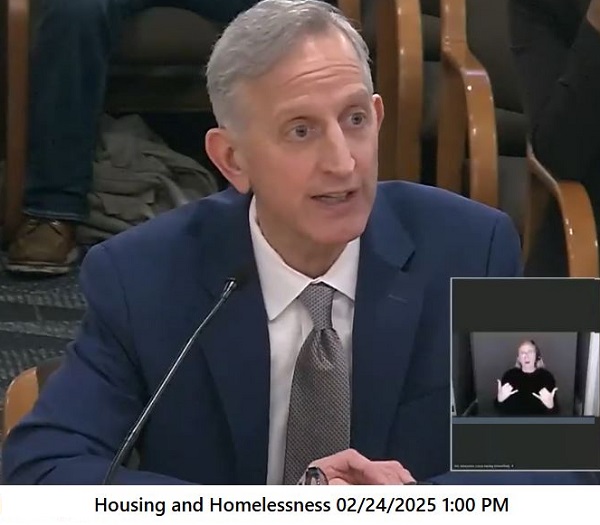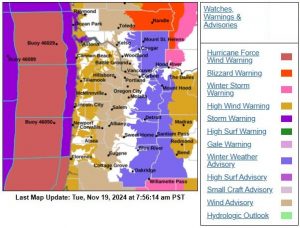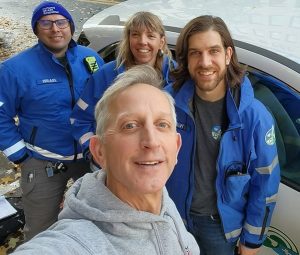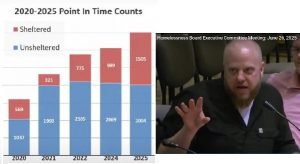Portland mayor: We must treat our homeless crisis with a scalable emergency response strategy
11 min read
Presenter: Tents on the street allow for criminal activity, Portland’s mayor told the House Committee on Housing and Homelessness Feb. 24. Describing his goal to end camping, Mayor Keith Wilson:
Keith Wilson (Portland, mayor): My name is Keith Wilson. I’m the mayor of Portland. Before I start, I wanted to thank you for the $217 million you are considering to address our homelessness crisis. We have hard and important work to do, but we are all in this together.
[00:00:27] I understand these dollars are for existing 24/7 beds. These are critical, but I’m going to continue hammering the importance of our missing link, which is scalable, cost-effective emergency nighttime shelter beds guided by an emergency response strategy.
[00:00:44] We face an overwhelming crisis. Too many of our neighbors are sleeping and suffering on our streets. Heroic work has gone into helping our neighbors and thousands have been helped already. That work must continue. What I’m talking about today is a plan to relieve the crisis and relieve the suffering, which we can’t do with tents, tarps, and unsafe RVs on our streets.
[00:01:08] And when we do that, the other parts of our system will be elevated and even more effective. And the entire Portland community will be able to recover from the crisis.
[00:01:18] Portland has the highest unsheltered homeless rate in our history. And the unsheltered are dying in unprecedented numbers. The recent Domicile Unknown Report shocks the conscience. We cannot look at this chart and think in terms of three-year plans, five-year plans, and 10-year plans. We must think in terms of the most good we can do right here, right now.
[00:01:42] And the 456 deaths that occurred in 2023 on the streets of Portland are only one part of the story. Forty percent of all firefighter callouts are to address unsheltered homelessness; 40% of all gun homicides are of the homeless. 53% of public defender clients are homeless.
[00:02:05] And the public wants change: 86% disapprove of Portland’s homelessness strategy and 82% support adding more shelter beds. We must change the way we think about this crisis and immediately and decisively respond.
[00:02:23] Livability and economic issues are compounding and our tax base is declining. Our job creation is among the worst in the nation. We’re losing our identity as a community of entrepreneurs, and worse, our livability has gone from being one of the most desirable cities in the country to one of the least.
[00:02:41] The Urban Land Institute (ULI) released their recent findings. They rank Portland as 80th out of 81 large communities. The Urban Land Institute gauges real estate values, development investment, livability, and a host of other items. What’s amazing about that statistic is in 2017, they rated Portland the third most desirable city in the United States.
[00:03:08] The solution isn’t complex. We must restore cleanliness, safety, compassion, and livability.
[00:03:15] And last week, the Portland Metro Chamber began to report on the state of the economy in Portland. The two most critical indicators that determine an economic health of a city are population and job growth. They are both declining, year after year.
[00:03:32] And the suffering are not nameless and faceless. Trevor: He’s from Seattle. His father John built him that movable shack so when he gets swept, he simply moves it onto the multiuse path and moves it out of the sweep zone. It’s become endemic. John is racked with fear and will do anything to help his son stay alive.
[00:03:54] My neighbor Elizabeth: She lives in the Greyhound station downtown and goes between the shelter and a tent as somebody addicted to fentanyl. It’s all so often the case in Portland.
[00:04:06] Doug: I was riding down and I saw two hospital security guards wheel this person naked out from the emergency room, stood him up in a park and he collapsed. I stopped to care for him. Our city had no care for him in his greatest time of need and the only thing we had from these security guards is to have them carry this man over to the park. I found him shelter. I picked him up and put him into a taxi.
[00:04:35] This isn’t something that is normal in an urban environment. Suffering people don’t get better living on the street. On the street, individual outreach is hampered, and those we want to help are too consumed by day-to-day survival to rebuild their lives.
[00:04:53] We must shift from a maintenance approach to a crisis response. We have devoted people who have been working and treating this like a crisis for years. We have to listen to them and mobilize the city to this moment. That starts with restoring the missing link: emergency nighttime shelters, also known as surge capacity, in a crisis response strategy.
[00:05:15] Emergency nighttime shelters are important, but they’re not intended to provide a comprehensive solution to the humanitarian tragedy on our streets. We’ll use nighttime shelters because we must treat the crisis like a crisis.
[00:05:27] Our goal is to compassionately, cost-effectively and immediately shelter our unhoused population, end public camping and once again prioritize basic norms of safety and sanitation. It’s a necessary step to repair, restore, and revitalize the quality of life, livability, and dignity for every Portlander, both the housed and the unhoused.
[00:05:49] Today we have about the same number of Portlanders sheltered as we did 13 years ago. However, unsheltered homelessness and spending has skyrocketed. Portland now has the highest unsheltered homeless rate in the nation, except for a few cities in California.
[00:06:03] This is counter to the cities I have studied and I’ve met with, like Boise, that have less than 200 unsheltered living on their street, and yet has housing that is higher cost than Portland. Or Boston that has less than 200 people living unsheltered on their street and again, has higher housing cost than Portland and is the same exact size of Portland.
[00:06:24] And then there’s Philadelphia that has less than 800 people living on their street, yet it’s twice the size of Portland. Portland, we have 5,398. What do they know that we don’t? They rely on nighttime emergency shelter to flex up and flex down based on the needs in their community. It’s not the only distinction, but it is a key distinction.
[00:06:49] Emergency night shelters are not a replacement for other housing programs. Project Turnkey, Safe Rest Villages, 24-hour supportive services, shelters, and supportive housing all have a critical role to play. Emergency shelters provide a ‘no wrong door’ first step for those who are ready to move off the streets and a safeguard for those who slip through the cracks of our complementary programs.
[00:07:14] They’re also a cost-effective pressure valve that frees up resources to help the rest of the system function. They’re low-barrier, trauma-informed locations. They generally use existing facilities like churches and businesses, community centers that are empty and available at night. They’re staffed with professionals, volunteers, and people with lived experience, and they’re complemented with day centers.
[00:07:38] Services at day centers include meals and showers and storage. It’s the first inning of the ballgame, just caring for people on the street, but we know the second inning is providing that linkage or that way off of the street to behavioral health or addiction services to address that individual’s needs.
[00:07:56] Sheltering the unsheltered is the missing link, but only the first step. We’re not warehousing our neighbors. We’re getting them on a path to stability, but that path must start with getting them off the street.
[00:08:10] The response from neighborhoods, businesses, nonprofits, and faith-based communities has been overwhelming. It’s so much more than I dared to hope. Businesses have come forward with lists of 40 locations to add to our existing list of 30 already. I called and convened a meeting at City Hall and 50 homeless service providers showed up that are interested in helping.
[00:08:30] There are unsheltered people who are ready right now. They’re ready for shelter, for addiction and mental health services, and to be reunited with their loved ones. And it’s time for us to turn to them and say Portland is ready too. We must raise the lowest level of the housing ladder from destitution on the street to a warm, safe bed for everyone in Portland.
[00:08:51] And I’m happy to say that we’ve already begun. While I’ve been in office for less than 50 days, we immediately opened up two shelters, with a third getting ready to open in the coming weeks and many more in the pipeline that we’re developing right now. The more we take care of folks who are ready, the more freed-up resources and momentum we’ll have to coax those who aren’t.
[00:09:13] So long as unsheltered homelessness is a crisis, we must respond as a crisis. And we’re building a movement. Local, county, regional, state, and even federal, they’ve all told me they’re stepping up. There’s an outpouring of support and I’m saying let’s turn that hope into action. When I look at the people I meet every day, I don’t see what I can or can’t do and/or accomplish in 100 days or dwell on principled disagreements.
[00:09:39] I look for the helpers and I’m grateful because I see helpers everywhere. And I want to say thank you for this opportunity. I think I gave us a little bit of time for some questions. So thank you so much.
[00:09:49] Presenter: Rep. Emerson Levy:
[00:09:52] Rep. Emerson Levy: Thank you Mayor, for being here. I have just a quick question around Boise. When I look at Boston, Philadelphia, they’ve had a long history of building up public housing in a way that simply the West Coast hasn’t been able to do. But Boise, what do you think is the big difference? And how many do they have in sheltered homelessness? Or do you know? And if you don’t know, feel free to get back to us.
[00:10:10] Keith Wilson (Portland, mayor): Thank you. So I’ve been working with Mayor Bieter, who had been the mayor for 16 years. And when he lost (the legal case) Martin v. Boise, yet kept such low unsheltered rates, I wanted to know what’s the difference between Boise and Portland.
[00:10:23] So he and I have been working for the last four or five years, kind of developing. When he lost the case, he had 120 encampments just around City Hall. And he was surprised by that. His police, fire, homeless service providers got called into City Hall and he said, ‘Why do we have these encampments? This is new.’
[00:10:39] And they said, ‘Well, Mr. Mayor, we lost the case.’ And he said, ‘We lost the case. But we’re not a camping city, we’re a caring city. Let’s set up shelters immediately.’ And they just ramped up and did a surge in 30 days and ended that. And he had some practical anecdotes that he shared with me as well.
[00:10:54] He said, ‘Keith, you’ve got to address this as a surge. You can’t let people suffer and die on your streets in an urban environment.’ So that, I can’t tell you what their shelter is. I could certainly get back to you if you’d like.
[00:11:09] Presenter: Rep. Cyrus Javadi:
[00:11:12] Rep. Cyrus Javadi: Mayor, what’s being done with the other, I guess I’d call them causes with public camping and the drug problem downtown in addition to wanting shelter. I mean, can you give us a brief glimpse of what Portland’s doing to deal with the other contributors to this problem?
[00:11:32] Presenter: Portland Mayor Keith Wilson:
[00:11:34] Keith Wilson (Portland, mayor): Rep. Javadi, you bet. They are, to some cases, tied together. I do explain that, it’s not a monolith. If there are 5,000 people living on the streets of Portland, there are 5,000 reasons. But I will tell you, Measure 110 and the changes we’ve made are certainly helping, allowing the officers to intercede more, and they are. So we are trying to address that and provide help. The deflection center that we just opened is working. Our officers are getting involved. Is it working en masse? No.
[00:12:02] Are we looking for opportunities to expand that? Yes. But the drug trade and the tents and the guns and the trade all go hand in hand. Removing the tents are critical because five years ago, officers would approach a tent. Today they say they don’t borrow trouble because in a lot of cases there are guns in the tent. There are drug dealing going on, human trafficking.
[00:12:25] So it’s really critical we remove the tents and the RVs and the makeshift shelters and it allows us to address those associated illnesses that may or may not be going on.
[00:12:36] Presenter: Rep. Jeffrey Helfrich:
[00:12:39] Rep. Jeffrey Helfrich: Mr. Mayor, thank you for being here. So from my history as a police officer in the city of Portland for about 25 years, I understand the plights of homelessness, but also what (Measure) 110 has done. But I think as you come to us as the city of Portland and asking for more money on how to help solve these problems, I think that, at least myself and maybe others have concerns about before you, your predecessors, and how they spent money and how they went about their business.
[00:13:03] And the one thing that comes to my mind right now is the water project that’s happening out in my East Multnomah County (Right) in my district, that’s $2.13 billion. (Yeah.) And so those are overspending things and which a city does. And so what are you going to do so we know that when we give you money, it’s going to go to the right projects and not these overspending things? Because that’s a big burden upon your ratepayers.
[00:13:22] Keith Wilson (Portland, mayor): Right, Rep. Helfrich, you’re right. When I looked at that water project, I saw a project that had the potential to just continue to grow as far as the price tag. So, we recently put that on hold to complete the permits. So, once we do begin that project, we can act fast and complete it to really keep the cost low. I share your concern with that project.
[00:13:42] When it comes to spending for homelessness, to open a shelter and/or a safe rest village, the cost per day per person is anywhere from $100 to $150. To open a nighttime emergency shelter, that cost can be as low as $20 to $30. We’re using money wisely and we’re lowering that overall spend that we’re currently under by about 70% or 80% per person to provide immediate life-saving care for those individuals.
[00:14:12] We are being very cost-effective on our ask to not only the state but to the federal government. We’re working with counties, Metro, we’re really talking to everybody about going in on this. But it’s going to be economically viable and pragmatic.
[00:14:28] I just want to thank you for this opportunity. I’ve been really working on caring for Portland for years, and this is a great honor to be before you. And I look forward to working with you, not only today, but in the weeks and the months and the years ahead. Thank you.
[00:14:39] Presenter: Portland Mayor Keith Wilson says the city should address unsheltered homelessness with an emergency response. He wants to remove tents and RVs by developing the city’s surge capacity.






